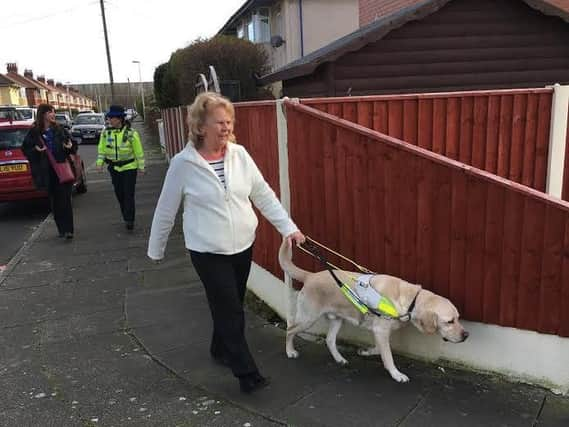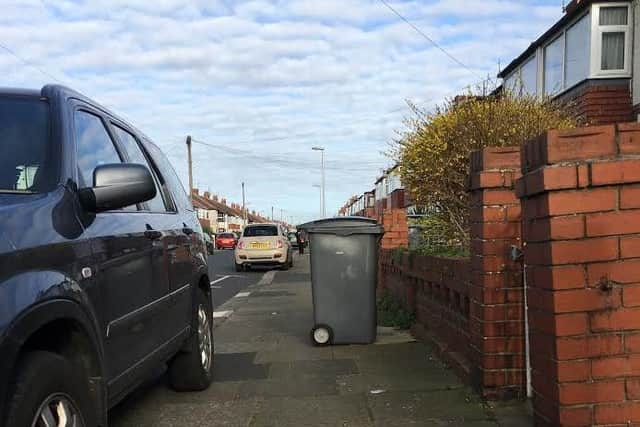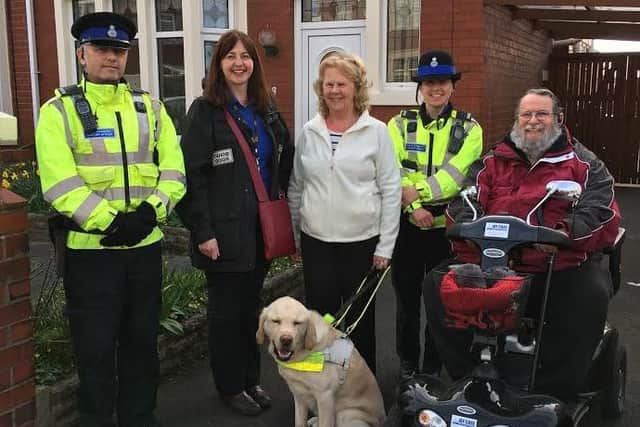Pavement parkers are putting lives at risk


We all do it.
But as far as one sector of the community is concerned, pavements should be strictly for pedestrians only.
Blind and visually impaired people increasingly feel they are being put in danger by the habitual use of the footpaths by motorists wanting to park.


Advertisement
Hide AdAdvertisement
Hide AdHere in Blackpool, many narrow residential streets necessitate parking on the kerb to enable traffic to get past.
But add this to wheelie bins left out, cyclists using the sidewalks, over-hanging branches and dog-fouling underfoot, and for many partially sighted and disabled people a simple walk to the shops becomes an obstacle course.
Carole Holmes, of Balham Avenue, South Shore, has been a long-time campaigner, urging people to be more considerate when it comes to keeping pavements clear.
She has suffered injuries from obstacles encountered with her guide dog Inca.


Advertisement
Hide AdAdvertisement
Hide AdHe does his best to negotiate the safest course, but inevitably protruding wing mirrors can cause a nasty bruise if she hits one.
Now, Blackpool's two new community partnerships in South Shore and North Shore have taken up the cause, gathering evidence from disabled residents about the difficulties they face.
They are hoping to persuade people to be more considerate, and are backing a national campaign to reclaim the pavements.
Carole recently took her local PCSOs (police community support officers) and Zoe Foster, Guide Dog Engagement Officer, on a walk round organised by the South Shore Community Partnership to demonstrate the difficulties people face.


Advertisement
Hide AdAdvertisement
Hide AdShe said: "I have been a guide dog owner for 28 years and enjoyed walking safely around Blackpool until five years ago, when pavements became difficult to negotiate safely.
"Now myself and my dog Inca regularly have to walk in the road because the pavements are blocked with cars, which sometimes reach overhanging branches.
"On bin day, I have to wait until the afternoon to venture out, as the empty bins are left strewn on the pavements and sometimes they have been blown over.
"Cars drive up on the pavements and park in front of myself and my dog, and on occasions doors have been opened and hit my dog.


Advertisement
Hide AdAdvertisement
Hide Ad"Sometimes I think I am invisible. I've been hit twice by cars reversing out of their drives, but luckily my dog has pulled me away and I have only suffered bruises. "
Carole believes it should be the law that the the first four feet of any pavement from the wall or fence is kept clear for pedestrians to move around safely.
The Guide Dogs charity launched a petition in February asking the UK Government to introduce a new law on pavement parking.
The law would not be a total ban but campaigners are asking for the same law as already operates in London, which makes pavement parking an offence except in areas exempted by the local council.
Advertisement
Hide AdAdvertisement
Hide AdZoe Foster, Guide Dog Engagement Officer said: “Guide dog owners in Blackpool face the daunting prospect of being guided into the road on a daily basis, risking their life in order to get around poorly parked vehicles.
"We have found this also impacts significantly on long cane users, parents with prams, wheelchair and mobility scooter users.
"A survey by Guide Dogs showed 97 per cent of blind or partially sighted people encounter problems with street obstructions, and 90 per cent of those had experienced trouble with a pavement parked car."
Readers can support the petition by going to:
http://eactivist.com/eaaction/action?ea.client.id=113&ea.campaign.id=63918&ea.tracking.id=website
Advertisement
Hide AdAdvertisement
Hide AdThe RNIB (Royal National Institute for the Blind) is also concerned about the issue.
A spokesperson said: "Being able to get out and about safely is very important to blind and partially sighted people.
"Not being able to do so can leave many people feeling unable to leave their own home independently, impacting on confidence, social networks as well as access to employment, leisure, healthcare etc.
"If there is insufficient space to walk along the pavement safely, bearing in mind someone walking with a guide dog or long cane may need a little extra space, many blind and partially sighted people report having to walk into the road to get past obstacles, which is clearly unsafe."
Advertisement
Hide AdAdvertisement
Hide AdMany visually impaired people in Blackpool come across obstacles on a daily basis.
Here are just a few of their experiences.
Nicky Askew, of Anchorsholme, said: "I take my son to school, and home again, guided by my beautiful Tillie.
"We have to negotiate around parked cars across the pavement. We very often do an off kerb manoeuvre, as Tillie would be guiding on the left, so my son is on my right.
"As we do the off kerb, he is now in the middle of the road. I am afraid I get really anxious and I have to say very cross."
Advertisement
Hide AdAdvertisement
Hide AdFred Lindley, of Cleveleys, said: "When I am out walking with my guide dog Taffy I encounter many problems due to street furniture badly placed, for example, wheelie bins left in the middle of the pavement and 'A' boards put out by shop owners.
"However, a bigger problem is vehicles parked on the pavement and at times there is not sufficient space to walk on the pavement, so I need to step into the road to walk round the vehicle putting myself and Taffy in a dangerous situation."
Lisa Daley, who lives near Blackpool town centre, said: "Last year a van driver was driving along the pavement, too fast in my opinion, and was heading towards me and my guide dog.
"I let the driver know it was a pavement and he called me a 'blind bat'. Cars are parked on the pavement in this area usually at peak times in the evening just before 6pm. "
Advertisement
Hide AdAdvertisement
Hide Ad"I should be able to walk along a pavement without having to worry about cars, vans and bikes appearing."
Wheelchair users also face problems.
Carol Neal of Dalkieth Avenue, Marton said: "I have to frequently move onto the road on Lancaster Road because of cars parked on the pavement.
"One day I had to cross the road three times because I could not pass between the car on the pavement and the wall."